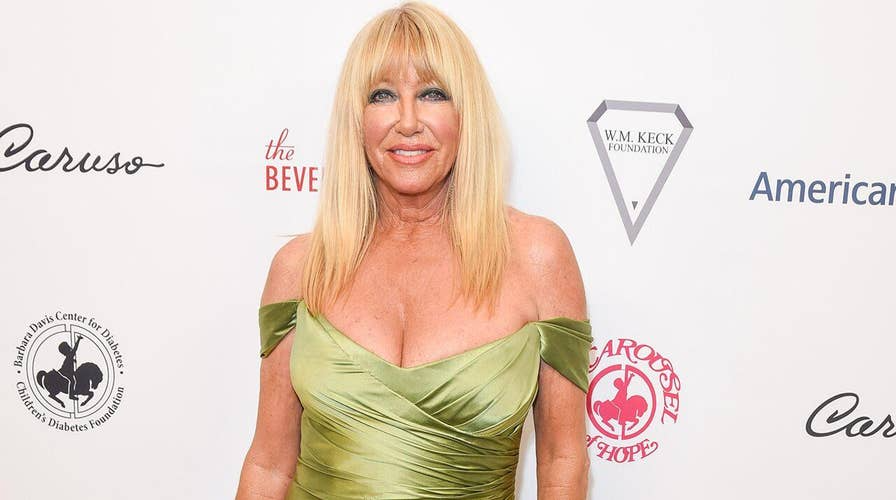
In 1980, Suzanne Somers was at the height of her career, winning critical acclaim and public admiration for her role as blonde Chrissy Snow on ABC’s Emmy-winning hit comedy “Three’s Company” alongside John Ritter and Joyce DeWitt.
In 1978, just a year after the show debuted, Somers won the People’s Choice Award for “Favorite Actress.”
In 1979, the role earned her a Golden Globe nomination for Best Television Actress in a Comedy Series.
Somers became a household name, appearing on TV countless times. She attended press events with her Three’s Company co-stars …… and became an international sex symbol.
But in 1980, at age 34, Somers’ career came to a halt when she asked ABC for a raise that matched that of co-star John Ritter. “When it came time to negotiate for the fifth season in 1980, Somers asked for a raise from $30,000 an episode to $150,000,” according to The Hollywood Reporter, which noted that the raise would “match what her Three’s Company co-star John Ritter was getting and be on par with what Alan Alda of M*A*S*H* and Carroll O’Connor of All in the Family were getting for their lower-rated shows.”
She also wanted 10% of the show’s profits.
Instead, ABC offered Somers a $5,000 raise. As a result, Somers boycotted the show’s third and fourth seasons, citing reasons like “a relapse of an old back injury,” THR reported at the time. She completed the remaining season under her contract with ABC, but her role was reduced to 60 seconds per episode and filmed separately from the rest of the cast. Ultimately, Somers’ contract with ABC was terminated. The network that had made the actress a household name had fired one of its biggest stars — and apparently it was all to make a point.

Somers’ husband and manager, Alan Hamel, recently told THR:
The night before we went into renegotiation, I got a call from a friend who had a high-level connection at ABC and he said, ‘They’re going to hang a nun in the market and that nun is Suzanne.’ The network was willing to do this because earlier that year, the women of Laverne & Shirley had gotten what they asked for and they wanted to end it. They would destroy the chemistry in Company to make a point.
At the end of that season, Somers’ character Chrissy Snow was replaced by her bumbling cousin, Cindy Snow, played by Jenilee Harrison. In 1981, ABC added another replacement for the following season, Priscilla Barnes, to make up for Somers’ loss. The show would continue until 1984, but in the meantime Somers’ career was going nowhere.
After rival network CBS picked Somers to star in a new show after the disastrous “Three’s Company,” the network eventually dropped the show.
To stay relevant, Somers posed on the covers of Playboy magazine in 1980 and 1984. In the 1980s, Somers became a spokesperson for Thighmaster. In 1991, Somers returned to ABC to play mom Carol Foster in “Step By Step,” a family comedy on the network’s popular TGIF program. After the show ended in 1998, Somers would continue to sell clothing, jewelry, skin care products, non-toxic toiletries, weight loss and beauty products on the Home Shopping Network and her own website.
She has written more than 20 books, including an autobiography, poetry, and several on aging and how to stay “Forever Sexy.”
Despite the controversy surrounding her use of alternative medicine after being diagnosed with breast cancer in 2001, Somers has continued to build a massive empire as an actress, author and entrepreneur.
In 2003, Somers received a star on the Hollywood Walk of Fame.
Today, Somers can be seen in the live show “Suzanne Sizzles” during a yearlong residency presented at her own cabaret room at the Westgate Las Vegas Resort & Casino. When not in Las Vegas performing, Somers lives in Palm Springs with her husband and manager of 38 years, Alan Hamel. “Life isn’t fair,” Somers recently told The Hollywood Reporter, recalling the “Three’s Company” situation in 1980. “Getting fired for asking for a raise wasn’t fair, but I stood my ground and I did well.”
Today, Somers is said to be worth upwards of $100 million, largely thanks to her successful product line. Somers’ story is especially relevant after the Sony hack revealed that women in Hollywood still earn far less today — both behind-the-scenes studio executives and in-front-of-the-camera actresses.
